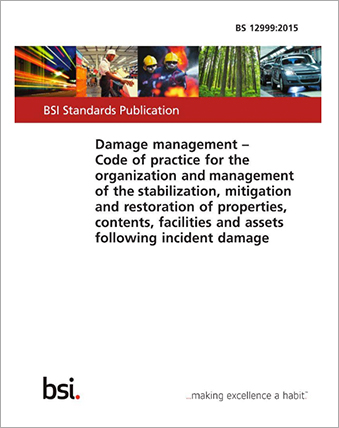
Standards
Code of practice for the organization and management of the stabilization, mitigation and restoration of properties, contents, facilities and assets following incident damage.
Click below to order printed copies online.
For electronic copies click on the ’buy & download BS 12999′ button.
BS12999 is the new British Standard for Damage Management, published in November 2015. It provides a code of practice that can be followed by damage management practitioners and acts as a source of reference for third parties, incident owners, businesses and members of the public.
The BSI’s decision to develop a standard for damage management recognized a need for a common framework for the organization and management of property recovery and restoration following incident damage.
Property damage can result from a range of incidents and take many forms. There are, however, generic management processes the damage management practitioner will follow between incident occurrence and completion of the recovery phase that will invariably apply, regardless of the nature of the incident or type of damage.
Particularly where damage is widespread, or causes a major impact, the response is likely to involve a number of parties each with varying roles and responsibilities and levels of authority. In addition to providing the damage management industry with a recognized code of practice, BS 12999 allows third parties to identify our industry’s role and facilitates collaboration during the recovery process.
Buy-in to the concept from bodies representing other sectors with a professional interest in response to property damage incidents included the Cabinet Office, the Environment Agency, the Association of British Insurers (ABI), the Chartered institute of Loss Adjusters (CILA), the British Insurance Brokers Association (BIBA), the Business Continuity Institute (BCI), the Emergency Planning Society (EPS), the British Institute of Facilities Management (BIFM), the Institute of Risk Management (IRM), AIRMIC and ALARM, the Public Risk Management Association.
Support from these key stakeholders, many of whom were directly involved in developing this British Standard, has been critical in producing a document that will be of value across a wide ranging demographic, providing a code of practice for damage management practitioners and a point of reference for third parties, incident owners, businesses and members of the public.
The British Damage Management Association (BDMA) greatly appreciated the opportunity to work with BSI on this important project and to chair the development of a standard that defines best practice for our industry.
Steven Richford
BDMA Chairman
November 2015
To buy and download a digital copy of this British Standard, please follow the link
To buy a hard copy of this British Standard, please click the button below:
